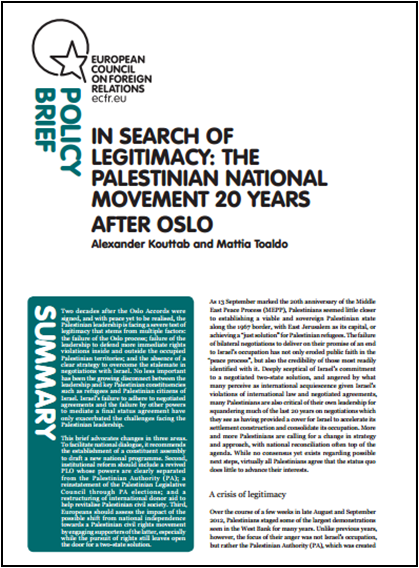In search of legitimacy: the Palestinian national movement 20 years after Oslo
How to rebuild the Palestinian national movement
Palestinians and Israelis have returned to negotiations. For the Palestinian leadership in Ramallah, the stakes are high. Public apathy towards negotiations, which many Palestinians see as a cover for continued occupation and settlement expansion, is but one of a long list of problems the leadership faces. Others include the failure of reconciliation talks, the Palestinian Authority’s fiscal crisis, a growing disconnect between the leadership and key Palestinian constituencies such as refugees and youth, and the ongoing realities of Israel’s occupation on the ground.
Collectively, these problems threaten to further weaken an already struggling Palestinian national movement, which many Palestinians fear has lost its way. They also compound a growing crisis of legitimacy facing the Palestinian leadership.
In a new ECFR policy brief, “In search of legitimacy: the Palestinian national movement 20 years after Oslo”, Alexander Kouttab and Mattia Toaldo argue that three areas need to be addressed if the Palestinian leadership is to overcome its present challenges:
Towards a new national dialogue: A constituent assembly – broadly representative of all Palestinians – should be established and charged with drafting a new national programme.
Institutional reform: The key to a new institutional framework is a clear separation of powers and responsibilities between the PLO and the PA. The Palestinian Legislative Council should also be reinstated through PA elections. And a restructuring of international aid programmes would help revitalise Palestinian civil society.
The EU and its member states should engage more seriously with Palestinian rights movements: The impact of the possible shift from national independence to a Palestinian rights movement needs to be assessed and integrated into the debate about a two-state solution.
Mattia Toaldo explained that “Many Palestinians have lost faith with the two-state solution altogether. Palestinian domestic politics must be factored in if the EU and the US want talks to succeed and agreements to hold.”
Alex Kouttab added, “A growing number of Palestinians fear for the future of the Palestinian national movement, while many are calling for change. Increasingly, the challenge facing the Palestinian leadership is to hold together a Palestinian national consensus based on an agreed set of national goals and strategies.”
The press release for this report is also available in Arabic.
Useful facts
• 58 percent of Palestinians believe that the two-state solution is no longer practical due to settlement expansion, while 69 percent believe that chances for the establishment of a Palestinian state in the next five years are slim to non-existent (Palestinian Center for Policy and Survey Research, June 2013 poll of OPTs residents).
• Only 3 percent of Palestinians aged 15-29 in the OPTs believe that negotiations alone can deliver Palestinians their rights (Sharek Youth Forum 2013).
• Despite their numbers (of which the 5,271,893 registered with UNRWA are only one part), Palestinian refugees have largely been marginalised from Palestinian political decision-making and have become peripheral to the Palestinian state-building project. Other marginalised constituencies include youth, prisoners, Palestinian citizens of Israel, and civil society organisations.
• On 15 November 1988, the PLO declaration in Algiers officially endorsed partition and the establishment of a Palestinian state next to Israel. This goal remains at the heart of the Palestinian national movement. However, fewer and fewer Palestinians believe that a Palestinian state will be established any time soon, prompting serious questions over how long the status quo can hold.
The European Council on Foreign Relations does not take collective positions. ECFR publications only represent the views of their individual authors.



